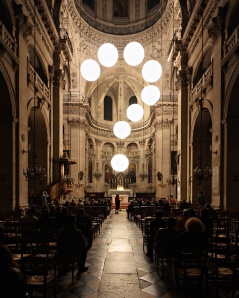Interestingly, several people have asked me in the past couple of weeks whether or not I still agree with the Nicene Creed. If you’re not familiar with the history of the Nicene Creed, here’s a crash course:
In 325 AD, one of the major discussions at the Council of Nicea (council = gathering of all significant bishops) was whether or not Jesus was actually a human or if he only seemed to be human (an idea known as docetism, and a logical result of Christian gnosticism). The Nicene Creed, which is similar in substance to the Apostle’s Creed and seems to be the final articulation of the creed found in I Corinthians 15:1-11, goes a bit like this:
We believe in one God, the Almighty, Maker of all things visible and invisible
And in one Lord Jesus Christ, the Son of God the only begotten of the Father; that is, of the essence of the Father, Light of Light, very God of very God– begotten, not made, being of one substance of the Father
By whom all things were made
Who for us, and for our salvation, came down as incarnate and was made human
He suffered, and the third day he rose again, ascended into heaven
From thence shall he come to judge the quick and the dead
And in the Holy Ghost.
The Nicene Creed is historically important because it establishes that one of the fundamental tenets of Christianity is the Incarnation. You might have heard me rave about the Incarnation before– to me, it is probably one of the most beautiful and significant doctrines of my religion. Immanuel, “God with Us,” means that God became flesh and dwelt among us, and I think that’s extraordinary. It tells me that my humanity, my physicality, my existence, my life– it matters. Considering I grew up in a world where everything about my flesh is wholly corrupt and evil and must be literally beaten into submission, the idea that God became flesh never fails to comfort me.
So, short answer: yes. I agree with the Nicene Creed. It’s considered one of the most essential definitions of Christianity, and I like that it is incredibly unifying. Catholics, Orthodox, Protestant– we all can come to the Nicene Creed and say here– here is where we are the same.
But . . . something sort of fell out of my mouth this morning while my partner and I were driving to church. Ever have those moments, where something you say seems like it’s been something germinating for a long time and all of sudden pops out as this fully-formed thought and it surprises you?
I was talking about how there are times when I desperately want to distance myself from the word Christian. I can’t get away, intellectually and emotionally, from my belief in a deity, and for a bunch of reasons I think that deity looks like Jesus. I want to follow Jesus– I believe that what he taught was beautiful and is worth trying to live out.
Sometimes, though, I look at religions like Buddhism and Wicca, and I think wow, there are some incredible ideas in these religions. For example, one of the most absolutely fundamental ideas of Wiccan practice is the Rede: An it harm none do what ye will, frequently shortened to “do no harm.” That’s the north star of Wicca, its central teaching: do no harm.
However, it seems to me that if you ask a Christian “what does it mean to be a Christian?” the answer you’re going to get is a list of varying beliefs, usually organized around something like the Nicene Creed.
Wouldn’t it be a spectacular if, instead, the answer to that question was they shall know you by how you love one another? Because, after all, what Jesus taught was love. Love each other. Love your enemy. Love your neighbor. Love the least of these.
What if the most absolute essential statement anyone could make about Christianity was that we love people? That how we loved was the only thing we really cared about or ever evaluated, and we stopped asking about how “theologically sound” someone is, or how “biblically based”? What if love were our North Star, instead of do you affirm the deity of Christ and his virgin birth?










